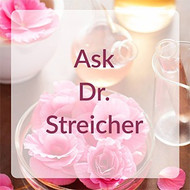Which Essential Oils Are Anti-sclerotic?
Apr 21st 2021
Posted by Amrita Aromatherapy
G. asked via Ask Dr. Streicher:
Can you tell me which oils are anti-sclerotic [i.e. reduce the hardening of tissues] and capable of clearing up mild plaque in the carotid artery?
I have several clients with this and it has been linked to tinnitus/hearing loss also (which I am treating with Helichrysum) but I feel I also need to address the carotid artery disease....
My research has indicated Lemon oil. Can it be applied neat (directly to the skin/neck)?
Also, I understand Lavender is antithrombotic (dissolves thrombus/blood clots in arteries). Can we blend Lemon and Lavender, or is it better to use them individually 20 minutes apart – Lemon for hard plaque and Lavender for inflammation?
Dr. Christoph Streicher answered this as follows:
I am not aware of any solid research on this. But, it might be worth trying these essential oils: Lemon, Lemongrass, Geranium and, most of all, Helichrysum. Also, terpene-rich oils like Juniper and Cypress are said to dissolve fats. Dilute the oil and apply over the heart area.
Avoid using Lemongrass during pregnancy. Dilute up to 2% in a carrier oil (10 drops per tablespoon).
While Rose Geranium is nontoxic, non-irritating and generally non-sensitizing, it can cause dermatitis in sensitive individuals. Dilute it up to 5% in jojoba or hazelnut oil (25 drops of essential oil per tablespoon of carrier oil).
Dilute Helichrysum to 5-10% in a carrier oil (25-50 drops per tablespoon). It is generally considered nontoxic and non-irritating. However, it may be sensitizing for some individuals.
Juniper Alpine is easier on the kidneys than Juniper Berry. Dilute either Juniper to 2% in a carrier oil (10 drops per tablespoon). They are both generally nontoxic and non-sensitizing, but some may find them slightly irritating. Avoid using them during pregnancy.
Dilute Cypress to 2% in a carrier oil (10 drops per tablespoon). It is nontoxic and non-sensitizing. If you find Juniper irritating, try this instead. Avoid during the first five months of pregnancy.
Lemon essential oil, like all essential oils, must be diluted before being applied to the skin. Up to 4% is a good dilution ratio for Lemon oil (20 drops per tablespoon of carrier oil). Please note that although Lemon essential oil is nontoxic, it can cause dermal irritation or sensitization reactions in some individuals. Use in moderation. It is phototoxic, so do not use it on skin exposed to direct sunlight.
Lavender essential oil is generally considered non-irritating, non-sensitizing, and nontoxic. But, you need to be confident you are using true Lavender Oil, as Lavender is one of the most frequently adulterated essential oils. Dilute it 3-5% in a carrier oil (15-25 drops per tablespoon).
Lemon and Lavender essential oils can be blended together.
Disclaimer: The statements made on this page have not been evaluated by the U.S. Food and Drug Administration (FDA). They are not intended to diagnose, cure or prevent any disease. If a condition persists, please contact your physician or healthcare provider. The information provided is not a substitute for a face-to-face consultation with a healthcare provider, and should not be construed as medical advice.
Original Published: 2016-08-22 / Last Modified: 2021-10-11

